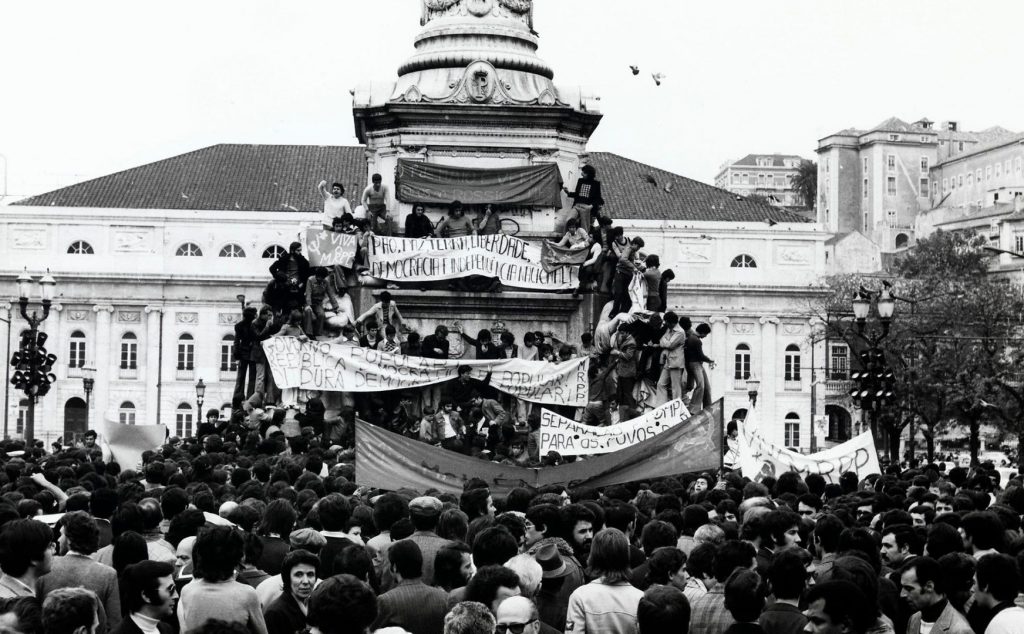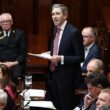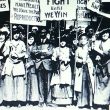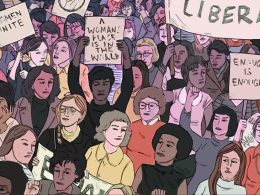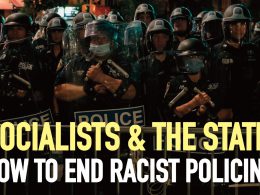By Pedro and Vanessa
Fifty years ago, the political upsurge of workers and youth In Portugal following the military coup of 25 April put an end to fascism and colonialism and sparked a social revolution. The occupation of houses, land and businesses, the setting up of residents‘, workers’ and soldiers’ committees, democratic organs of power for the working class, showed how to win the implementation of universal public services and the nationalisation of most of the economy. Despite the enormous political, economic and social achievements, in the absence of a revolutionary party with mass influence, the revolution was interrupted. The capitalist democracy that was established is showing today how it is incapable of guaranteeing quality housing, health and education for all, of preventing climate catastrophe or the proliferation of wars around the world. As in 1974 and 1975, socialism is today an objective necessity in the face of the concrete problems of capitalist barbarism and the Portuguese Revolution contains important lessons for those who want to transform society.
The fascist regime, from 1926 to 1974, under the leadership of the dictators Salazar and Marcello, was marked by the repression of opposition through torture, forced labour and death, the banning of democratic freedoms and strikes, the crushing of workers’ organisations, the establishment of censorship and the political police and the union between the state and private monopolies, under the ideology of the commonality of interests of Capital and Labour, supposedly the interests of the ‘Greatness of Portugal’. But there was nothing Great to that Portugal. During those 48 years there was misery in terms of income, housing, health and education. The strength of the fascist regime and Portuguese capital lay in economic control over the colonies, sources of raw materials and markets for the disposal of goods. As the extraction of wealth from the colonies did not depend on labour at home, Portugal was kept unproductive and underdeveloped, with a model of low wages and repression of workers.
The subservience of Portuguese capital to outside interests made it fragile in the face of struggles of the colonised peoples who were even more repressed and underdeveloped than the Portuguese people. The War of Liberation in the Portuguese colonies (Angola, Mozambique, Guinea-Bissau) from 1961 onwards represented a serious blow to the fascist regime. From then on, a total of 1.2 million soldiers were deployed in the war over 13 years, equivalent to 15 percent of the Portuguese population at the time, were forced to take part in the war. Official figures include 9,000 dead and more than 15,000 permanently disabled on the Portuguese side and more than 60,000 dead on the African side. During this period, despite rapid industrialisation in Portugal, the cost of living increased and the pressure to escape the war led to 100,000 people emigrating every year. The colonial war went on forever and by 1973 it was already consuming more than 40% of the state budget, at the expense of social spending such as on education, health and social security, and it slowed down the pace of state investment in the country’s infrastructure. In the six months leading up to the coup of 25 April 1974, around 100,000 workers went on illegal strikes to halt the fall in real wages.
In the wars in Africa, the soldiers and junior officers saw that the conditions of poverty in Portugal were the product of the same system and the same oppression that created misery in the colonies and started to forge bonds of solidarity with the Africans. They also saw that the war could not be won by the Portuguese state, and that each victory for the colonised in Africa weakened the common enemy and was therefore also a victory for the exploited in Portugal, bringing the workers closer to power in the various countries. The anti-colonial revolutions were the key to Portugal’s liberation from fascism.
Fall of the fascist regime in Portugal
In 1973, the Armed Forces Movement (MFA — Movimento das Forças Armadas) was formed, a clandestine military organisation led by middle-ranking officers (lieutenants, captains and majors) who wanted an end to the colonial war. On 25 April 1974, the MFA carried out a successful peaceful military coup. Upon demanding the surrender of dictator Marcello Caetano, the regime fell like a house of cards. The success of the coup required not only the leadership of the MFA but also the determination of the soldiers, most of whom came from working-class backgrounds, to put an end to the regime, knowing that if the coup failed they would be accused of treason.
Despite the MFA asking civilians to stay at home, on 25 April itself, when Marcello’s surrender was not yet complete, the masses filled the streets of Lisbon in support of the rebellious soldiers, turning the coup into the start of a revolution, a period in which it is the masses who make history.
It was popular mobilisation that, on 25 April and in the days that followed, ensured the success of the coup, the effective establishment of political and trade union freedoms, the release of political prisoners and, also through the fraternisations in Africa between soldiers and guerrillas, paved the way for the end of the colonial war and the recognition of the self-determination of peoples. A few days after the coup, on the first 1 May in freedom, more than a million people demonstrated in celebration, consecrating the revolution and showing that the end of fascism was not achieved merely by means of a surgical military coup.
The revolution advances, and with it the duality of power
With the end of repression and the feeling of having the military on their side, the working class felt the freedom to organise and the accumulated anger against their exploiters exploded. As early as 26 April 1974, residents of the shantytowns in the industrial belts of Lisbon, Setúbal and Porto began organising occupations of empty houses, a process that continued and intensified. To organise the struggle for housing, residents’ committees were set up, the first organs of proletarian power. At the same time, peoples’ medical clinics, home improvement committees, peoples’ crèches, literacy courses, committees for the democratic management of schools and hospitals were set up, with the aim of achieving democracy in the workplace and universal access to health and education.
In the workplaces, the biggest wave of strikes to date began to take shape. Demands were made to get rid of the fascists in companies and the state apparatus, to create a national minimum wage that would adjust to inflation, an 8-hour working day, the right to weekends off, paid holidays and an extra month’s salary. Many struggles were led by women workers who, among other things, demanded equal pay for equal work, the right to divorce, an end to moral and sexual harassment and the establishment of crèches, nurseries and breastfeeding rooms in the workplace. In several companies, when the bosses wouldn’t give in, the company was taken over and put under workers’ control, under the democratic self-management of a workers’ committee. In others, union committees were formed to continue organising the struggle. The demands included the right to housing, health, education, sometimes the nationalisation of the company and, of course, peace and the return of the soldiers from Africa.
In December 1974, in the Alentejo and Ribatejo, regions where large estates played a dominant role, the landowners began to close the fields to the workers, to prevent sowing and bring hunger, in order to sabotage the revolution. In response, the rural proletariat occupied the land to control wages and agricultural production, setting in motion the Agrarian Reform, i.e. the beginning of the realisation of the demand “Land for those who work it”, and increasing production. Private property was called into question and many bourgeois fled after destroying factory and service equipment. On the outskirts of the big cities, forms of coordination of residents’ and workers’ committees, embryos of soviets, were beginning.
The conquests of the Revolution were not achieved without overcoming resistance from reactionary forces. Twice, on 28 September 1974 and 11 March 1975, the Right, led by Spínola, tried to put an end to the Revolution by force, in favour of a neo-colonial and presidentialist project that would concentrate power in Spínola, in order to defend the interests of capital accumulation. Both times, tens of thousands of workers and soldiers took to the streets and formed barricades, preventing the coups and even avoiding violence. The defeats of the coup attempts led to leaps in the radicalisation of the masses and the working class’ awareness of its revolutionary tasks.
The response to 11 March was mass mobilisations across the country and occupations of companies and properties. Bank workers went on strike, occupied the workplaces and demanded their nationalisation. The same happened in companies such as CUF (industrial conglommerate), Lisnave (shipyards), the post offices and transport companies. The nationalisation of the banks marked the beginning of a wave of nationalisations over the following weeks, which reached a total of 244 companies, including all the banks, insurance companies, the steel industry, transport, energy, cement, cellulose and tobacco. These measures were the result of widespread demands among the working class and the governing parties (PCP, PS and PPD) had to support the nationalisations, although they refused to expropriate foreign capital. More than 70 per cent of the economy was transferred into state hands.
Elections for the Constituent Assembly
Everything pointed to the defeat of capitalism in Portugal. The British newspaper The Times declared that “Capitalism is dead in Portugal” and the US magazine Time published on its cover “The red menace in Portugal”, with portraits of President Costa Gomes, Prime Minister Vasco Gonçalves and Otelo Saraiva de Carvalho, the orchestrator of the 25 April 1974 coup and commander of COPCON, a military special forces division created to enforce the MFA programme, which supported popular power and the occupations of homes and businesses and had links with the parties of the so-called extreme left.
Further evidence of the apparent defeat of capitalism was the campaign for the Constituent Assembly elections, the first free elections, to be held on 25 April 1975. The balance of power was such that all the parties from the Social-Democratic Party (PPD -now the PSD) to the left swore to defend socialism. Even the CDS claimed to defend “a classless society, harmonised by Christian humanism”. These elections saw the highest turnout ever: 92 per cent of voters turned out to vote. The Socialist Party (PS) got 38 per cent, the PPD 26 per cent, the Portugese Communist Party (PCP) 12 per cent, the Christian democratic -People’s Party (CDS) 8 per cent, and the parties linked to the PCP or to its left 8 per cent. This result did not reflect the actual social influence of the PCP and the far left, but rather showed that the masses who voted rejected the Stalinist dictatorships and the authoritarian model represented by the PCP. The campaign by the PS, and to some extent the PPD, for ‘socialism in freedom’ paid off for them.
On the one hand, this election result was yet another demonstration of the mass will to build a classless society, based on a planned economy, popular power and cooperation between peoples. On the other hand, these elections legitimised the PS and PPD as parties with majority electoral support, which allowed their leaderships, especially those of the PS, to launch an offensive against the advances of the revolution, contrary to the socialist slogans they were presenting.
Revolutionary crisis
Deprived of the usual tools (control of the state and the armed forces and economic sabotage) to stop the revolution, the bourgeoisie was saved by the policies of the leaders of the mass workers’ parties: the PS and the PCP. This became evident in the revolutionary crisis that unfolded during the rest of 1975. In this period, power was more contested than ever, with the state increasingly divided and unable to act decisively. The workers were also divided on the question of seizing political power, without a leadership that would point them to the conclusion that this was necessary. In the absence of delivering a final blow to the bourgeoisie, it was able to reorganise itself against workers’ power.
From May 1975, foreign countries began to boycott the revolution, exploiting the fact that foreign investments had not been nationalised. The foreign bourgeoisie also began to bet more decisively on the PS. At the same time, far-right terrorist groups began a wave of bomb attacks against left-wing parties, namely the PCP, Portuguese Democratic Movement (MDP) and Popular Democratic Movement (UDP).
However, the counter-revolution was not consolidated. The Prime Minister of the Sixth Provisional Government complained that he wasn’t allowed to actually govern. Neither the military, nor the unions, nor the workers’ committees obeyed him, and there were daily demonstrations against the government, including the 36-hour siege of the government and the Constituent Assembly by construction workers on 12 November 1975. The government even suspended its functions. There was a complete crisis of power.
Military officers close to the PS realised the need to stop the revolution by force to regain control of the situation. The opportunity came on 25 November 1975, when paratroopers occupied strategic bases in Lisbon, demanding the overturning of the expulsion of left-wing military officers. It was the pretext for carrying out the counter-revolutionary coup. Álvaro Cunhal, leader of the PCP, made a deal with the Right, ensuring that members of the PCP and the CGTP Intersindical and military personnel linked to them would refrain from taking action. In return, the PCP would not be repressed and would be allowed to maintain its role in the capitalist state, which was its goal all along, given the PCP’s stageist conception of the revolution that defends the supposed democratic revolution and the postponement of the socialist revolution to an undefined future. Despite its importance, the revolutionary left in the military, having neither organised any involvement of the working masses nor armed them, found itself isolated and quickly surrendered.
The balance of power didn’t turn completely against the workers, who had built up a huge force, but demoralisation set in and legality and order were established. Occupations were no longer accepted and several were repressed by the police. The workers’ and residents’ committees, in the industries, neighbourhoods and on the land, lost effective power and were slowly ousted. The period of dual power during the 19-month revolution, during which the masses made history, was over. The capitalist state’s task of regaining order and control was accomplished. Its new task was to normalise bourgeois democracy and restore the conditions for capital accumulation, in particular by returning to the policy of low wages to attract foreign investment. Unlike the case in Chile in 1973, in Portugal the counter-revolution took a democratic form and Mário Soares’ PS played the leading role in devising and realising the counter-revolutionary strategy.
Lessons from the Portuguese Revolution
The victories of the revolutionary period bore fruit for years and even decades. In the revolutionary period, workers and youth in Portugal showed that they could put everything on the line, improve their lives and decide on collective life. They were able to have democracy in the workplace and work with pleasure and a sense of usefulness. Everything we have won has been thanks to the organisation and direct action of the masses and, in particular, to the forms of proletarian power they have built. The improvements in housing conditions in the decades following the revolution were due to the housing occupations. Democratic, labour and social rights are due to the strikes, expulsion of fascist bosses, occupations and workers’ control of industries, land and services. It was the democratic committees in schools and the literacy courses run by volunteers that won the extension of universal education. It was the doctors and nurses in the democratic hospital committees and in the creation of popular clinics who imposed what would become the National Health Service. However, the emerging regime was the fruit of counter-revolution. No reform is guaranteed under capitalism and much of what was won has been lost or is at risk.
Although the state has had left-wing leaders, it has never ceased to be a capitalist state, with a bourgeois structure prepared to maintain the capitalist order. In the situation of the world economic crisis of 1974 and 1975, and after the humiliating defeat of the US in Vietnam, it was possible for the proletariat to take power without suffering direct intervention from foreign imperialism in a European country, as was seen by its passivity until May 1975. Without the support of foreign capital and without popular support for reaction, the Right did not have the resources to carry out the counter-revolution. The triumph of the socialist revolution in Portugal could have directly influenced the working class in other countries such as Spain and Greece, also emerging from under right-wing dictatorships in the same period. In this best case scenario, we could today be living in a world where no one wages wars and people cooperate, where the economy is planned to serve social and environmental needs, avoiding climate catastrophe, where people work with pleasure and decide together how to work and live better.
This did not materialise. The key factor that capitalism could count on to prevent the socialist revolution by democratic means was the reformism of the leaderships of the workers’ parties. Neither the PS nor the PCP promoted the unity of residents‘, workers’ and soldiers’ committees into forms of broader proletarian power, such as soviets. These could have posed a strong proletarian power against the weak bourgeois state, opening up the possibility of resolving the crisis of dual power through the seizure of full power by the workers. The revolutionary organisations of the so-called far left never achieved mass influence and were unable to prevent capitalism from being saved. There was a lack of a political programme that showed the way to seizing power and building a Workers’ State, governed by Workers and for Workers. Today, as 50 years ago, the contradictions of capitalism engender crises, catastrophes, wars and revolutionary explosions, and the socialist transformation of society remains the way to rid ourselves of barbarism, which can only be achieved with a revolutionary party with mass influence.





